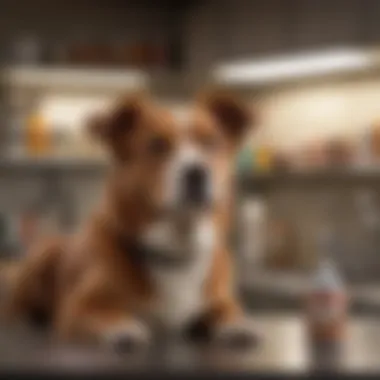Managing Diarrhea in Dogs: Effective Remedies & Tips


Intro
Diarrhea is a common issue for dogs that can cause concern for pet owners. Understanding the reason behind this condition is crucial. This section aims to provide insights into the importance of managing diarrhea effectively.
Understanding Your Pet
When tackling diarrhea, it is essential to consider your dog’s characteristics.
Breed Traits
Different breeds may be predisposed to gastrointestinal issues. For example, small breeds like Chihuahuas often have more delicate systems. Large breeds, like German Shepherds, can experience severe consequences from diarrhea. Knowing your dog’s breed can guide treatment options.
Common Temperaments
A dog's temperament can affect how they respond to illness. Active dogs might show agitation when uncomfortable, while more passive breeds may hide their distress. Observing behavioral changes can provide clues about the severity of the issue.
Special Needs
Some dogs have specific dietary requirements or health conditions. For instance, dogs with pancreatitis need careful diet management. If your dog has special needs, consult your veterinarian before making any changes to their diet.
Pet Care Essentials
Managing your pet's health involves several essential practices.
Nutrition and Feeding Guidelines
Adjusting diet is often the first step in managing diarrhea. Offer bland foods like boiled chicken and rice. Gradually reintroducing their regular diet is key, ensuring it is well-balanced and nutritious.
Grooming Tips and Techniques
A clean dog is a healthy dog. Regular grooming helps keep skin healthy and reduces the chance of infections. This is particularly important for dogs with long fur, as it can trap dirt and bacteria.
Health and Wellness
Routine check-ups and vaccinations play a vital role in your dog's overall health. Keeping up with veterinary advice ensures that minor issues don't escalate into serious health concerns.
When to Seek Veterinary Help
It's not always easy for pet owners to decide when to consult a veterinarian. Here are some indicators:
- Duration: If diarrhea persists for more than a day.
- Dehydration signs: Such as dry gums or lethargy.
- Accompanying symptoms: Fever, vomiting, or blood in the stool.
Understanding Diarrhea in Dogs
Understanding diarrhea in dogs is crucial for pet owners. It is not just a transient issue; it can indicate underlying concerns about your dog's health. Recognizing the symptoms and causes allows for prompt action, which may prevent complications. This section empowers dog owners with knowledge. The insights provided here will help them make informed decisions regarding their pet's care.
Definition and Symptoms
Diarrhea in dogs is characterized by an increase in the frequency of bowel movements, with stools being loose or watery. It can occur suddenly or develop gradually. Symptoms often associated with diarrhea include:
- Increased urgency in needing to defecate
- Changes in the consistency of stools
- Nausea
- Abdominal discomfort
- Lethargy
Being attentive to these symptoms is vital. It allows for proper assessment of the situation and timely interventions.
Common Causes of Diarrhea
There are varied factors that contribute to diarrhea in dogs. Understanding these can help in managing the condition effectively.
Dietary indiscretion


Dietary indiscretion is a term that refers to dogs consuming inappropriate items. This can be anything from table scraps to garbage. A key characteristic of this behavior is its commonality. Dogs are often eager to explore anything that can be ingested. Dietary indiscretion can result in gastrointestinal upset, leading to diarrhea. One unique aspect of this cause is its immediate and visible nature. Pet owners can usually connect the behavior to the onset of diarrhea. While it's often an isolated incident, repeated indiscretion may lead to chronic issues.
Infections
Infections can arise from various pathogens, including bacteria and viruses. A significant characteristic of infections is their potential contagiousness. Some infections can spread among dogs, making it crucial to monitor symptoms closely. Identifying the infection's source can help in deciding on treatment options. The unique feature of infections is that they may also present alongside other symptoms, such as fever. This can complicate the diagnosis, making veterinary consultation advisable.
Parasites
Parasites are another potential cause of diarrhea. They can range from intestinal worms to protozoa. A key characteristic of these organisms is their ability to invade the gastrointestinal tract, causing irritation. This leads to diarrhea and other digestive disturbances. One unique aspect of parasite-related issues is that they are often preventable through regular veterinary care and appropriate medications. However, untreated infestations can lead to more severe health problems in dogs, which makes rapid identification essential.
Allergies and intolerances
Food allergies and intolerances can provoke gastrointestinal responses, including diarrhea. A key feature of this condition is that it may manifest after a specific food has been ingested multiple times. Allergies often cause an immune reaction, while intolerances can lead to digestive difficulties. Understanding the differences between the two can help in diagnosis. One advantage of recognizing allergies or intolerances is that dietary adjustments can typically resolve the issue. Still, proper identification may require veterinary testing.
Underlying health issues
Finally, underlying health issues can also manifest as diarrhea. Conditions such as liver disease, pancreatitis, or inflammatory bowel disease can disrupt normal digestion. A key characteristic of these issues is their complexity and often chronic nature. This means they may require ongoing management. A unique feature of underlying health issues is that they may exhibit multiple symptoms besides diarrhea. Early detection through veterinary assessments is crucial to prevent advanced complications.
Understanding these causes allows pet owners to take appropriate measures and make informed decisions regarding their dog's health.
Assessing Your Dog's Condition
Assessing your dog's condition is a crucial step when dealing with diarrhea. Understanding how your dog is reacting can guide you in determining whether home care is sufficient or if professional intervention is needed. Monitoring their behavior, appetite, and energy level can give you insight into their overall well-being. This assessment not only promotes timely action but also helps you communicate effectively with your veterinarian if necessary.
When to Monitor at Home
Monitoring your dog at home is essential during mild cases of diarrhea. Observing their symptoms for the first 24 to 48 hours helps you gauge if the condition is improving, worsening, or remaining the same. If your dog is otherwise healthy and the diarrhea is not severe, you can choose to watch them closely. Make sure to offer plenty of fresh water to prevent dehydration. Note their elimination habits, as frequent trips outside may indicate a more serious underlying issue.
Identifying Serious Symptoms
Certain symptoms require immediate attention. Recognizing them helps you decide when to consult a veterinarian.
Blood in stool
Blood in stool is a serious indication that warrants prompt assessment. It could suggest internal bleeding or severe intestinal irritation. The presence of blood, whether it is bright red or dark and tarry, is a strong sign that the condition is affecting the gastrointestinal tract. This symptom is critical for understanding the severity of your dog's condition. Furthermore, it highlights the need for veterinary intervention, as only a professional can diagnose the underlying cause accurately.
Vomiting
Vomiting often accompanies diarrhea, but its significance should not be underestimated. When a dog vomits, it can lead to further dehydration, complicating the situation. Persistent vomiting could indicate a more serious health issue, such as gastrointestinal obstruction or poisoning. Dogs that are vomiting should be closely monitored, and if it continues, a trip to the vet becomes necessary. Recognizing this symptom early allows for timely treatment, which is vital for your dog's recovery.
Lethargy
Lethargy is a crucial sign of distress. If your dog is unusually tired, uninterested in playing, or showing signs of weakness, it may indicate that their body is fighting an infection or dealing with dehydration. This change in behavior often correlates with other symptoms, such as diarrhea or vomiting. Lethargy should not be taken lightly; it may be an indication that your dog's health is declining, necessitating additional medical evaluation.
Loss of appetite
A sudden loss of appetite is often a red flag for pet owners. When a dog refuses to eat, it may reflect their discomfort or indicate an underlying illness. This symptom can also contribute to further weakening if the diarrhea continues, as proper nutrition is critical for recovery. If your dog shows no interest in food for more than a day, consulting with a veterinarian is advisable to prevent further complications.
Always remain vigilant when assessing your dog's condition. Changes in their health can escalate if not addressed promptly. Taking immediate action can safeguard your pet's well-being.
Dietary Changes for Diarrhea
Dietary changes play a crucial role when managing diarrhea in dogs. Correct modifications in diet can help restore digestive balance and improve overall health. Specific dietary elements can provide relief from gastrointestinal upset, while ensuring a well-rounded nutrition. Understanding what to feed and what to avoid is essential for recovery and ongoing wellness for your pet.
Bland Diet Recommendations
Boiled chicken and rice
Boiled chicken and rice is a widely recommended meal for dogs experiencing diarrhea. Its simplicity and digestibility make it ideal for sensitive stomachs. The key characteristic of boiled chicken and rice is its low-fat content, which minimizes strain on the digestive system. Additionally, being bland helps mitigate further irritation to the stomach. A unique feature of this combination is its palatability. Many dogs find it tasty, which encourages them to eat, even when unwell. However, it is important to ensure that chicken is cooked without seasoning or skin, as additives can worsen symptoms. The main advantage is that it supports hydration and gives energy, which is vital when your dog is suffering from diarrhea.


Pumpkin puree
Pumpkin puree is another beneficial food choice during episodes of diarrhea. The key characteristic of pumpkin is its high fiber content. This can assist in firming up stool consistency, depending on the type of fiber. Its unique feature includes being low in calories and high in nutrients. It provides vitamins and minerals necessary for recovery. While pumpkin is generally safe, excessive serving may cause further digestive issues. Moderation is critical. Its main advantage is that it can be easily mixed with other bland diet options to encourage eating, making it a popular remedy among dog owners.
Bone broth
Bone broth is often praised for its nutritional benefits, especially during illness. Its key characteristic is that it is rich in vitamins, minerals, and amino acids. This nutrient-rich broth can help keep dogs hydrated while providing energy. One unique feature is its easy digestibility, which is beneficial when a dog has an upset stomach. However, it is important to make bone broth without any added seasonings or spices that could irritate your dog's digestive system. A primary advantage of using bone broth is its appeal; most dogs find it delicious, which can stimulate appetite during recovery.
Foods to Avoid
Dairy products
Dairy products generally do not sit well with dogs, especially during bouts of diarrhea. The key characteristic of dairy is that it can be difficult for many dogs to digest. Many adult dogs are lactose intolerant, meaning they have trouble digesting lactose, the sugar found in milk. A unique feature of dairy is that while it may seem harmless or even nutritious, it can lead to further gastrointestinal upset. Avoiding dairy ensures that you do not worsen your dog's condition. The disadvantage of offering dairy is that it may lead to bloating, gas, or worsen diarrhea.
Fatty foods
Fatty foods are another category to steer clear of when managing diarrhea. The key characteristic of these foods is that they can overwhelm the digestive process, leading to increased GI distress. A unique feature of fatty foods is their tendency to irritate an already sensitive stomach. This can lead to symptoms such as vomiting and further diarrhea. Thus, it is vital to avoid high-fat options like fatty cuts of meat or fried foods. The main disadvantage is that these foods can increase the duration and severity of diarrhea.
Human snacks
Human snacks, such as chips or sugary substances, are often harmful to dogs. The key characteristic of many of these snacks is they lack essential nutrients while containing ingredients that can be harmful. A unique feature of human snacks is that they often have preservatives, seasonings, or high sugar content that can irritate a dog's digestive system. These snacks should be avoided, as they can lead to digestive disorders and worsen diarrhea. The disadvantage of feeding your dog human snacks lies in their potential to contribute to dietary imbalances.
Always consult with a veterinarian before making significant changes to your dog's diet, especially during health issues.
Over-the-Counter Solutions
Over-the-counter solutions play a critical role in managing diarrhea in dogs. These remedies can provide pet owners with quick relief options before seeking veterinary care. Understanding the various products available can enhance your ability to care for your pet effectively. The benefits include convenience, accessibility, and often, cost-effectiveness. However, careful consideration is essential when selecting suitable options for your dog, as not all remedies suit every condition.
Available Medications
Probiotics
Probiotics are live bacteria that can offer significant support to a dog’s digestive system. These beneficial microorganisms help rebalance the gut flora, promoting better digestion and overall gut health. Many pet owners prefer probiotics because they are generally safe with minimal side effects. Unique features include their ability to reduce the duration of diarrhea and restore normal stool consistency. However, results can vary; not every dog may respond positively. It’s also advisable to consult a veterinarian before starting any new supplement regimen, especially if your dog has pre-existing conditions.
Antidiarrheal agents
Antidiarrheal agents work by slowing down intestinal movement, which can help limit the frequency of bowel movements. Common products like loperamide may provide fast relief for some dogs experiencing diarrhea. The key characteristic of these agents is their effectiveness in managing symptoms rather than addressing the underlying cause. They tend to be a popular choice among pet owners looking for immediate results. However, caution is necessary, as some antidiarrheal medications can be inappropriate or harmful for dogs with certain conditions, such as infections or toxic ingestions. Consulting with a veterinarian before administration can ensure the safety and effectiveness of these solutions.
Homemade Remedies
Electrolyte solutions
Electrolyte solutions are an excellent way to keep your dog hydrated during bouts of diarrhea. These solutions help replenish lost fluids and essential nutrients. The key characteristic is their ability to restore hydration quickly, making them a beneficial choice in maintaining your dog's health. A unique feature of these solutions is their formulation, specifically designed to replace the electrolytes lost during diarrhea. While they tend to be safe, it is crucial to choose products specifically designed for dogs; human-oriented solutions may contain harmful ingredients for pets.
Rice water
Rice water is a simple remedy made by boiling rice in water and then straining it. This watery substance can provide some nourishment while being gentle on the stomach. Rice water is especially favored for its soothing properties, making it a great option when dealing with diarrhea. The advantage lies in its easy preparation and widespread availability, making it accessible for every pet owner. However, rice water should not be a long-term solution as it lacks essential nutrients, serving primarily as a temporary aid in digestion issues.
When to Consult a Veterinarian
When it comes to managing diarrhea in dogs, understanding when to seek professional help is crucial. Many pet owners may initially treat minor cases at home. However, knowing the right time to involve a veterinarian can prevent further complications. This section outlines the signs that indicate a veterinary visit is necessary, as well as emergency situations that warrant immediate attention. By acting decisively, pet owners can help ensure their dog's health and well-being.
Signs Indicating a Veterinary Visit
Recognizing the signs that indicate a need for veterinary consulting is vital for any dog owner. If diarrhea persists for more than 24 hours, it is prudent to consult a veterinarian. Other warning signs include:
- Blood in stool: This can indicate serious conditions that may require immediate care.
- Vomiting: This symptom, when combined with diarrhea, can lead to severe dehydration.
- Lethargy: If your dog seems unusually tired or lacks energy, this could be a cause for concern.
- Loss of appetite: A sudden decline in eating habits might signify an underlying problem.
Pet owners should keep these signs in mind and not delay seeking veterinary advice when they notice them. Prompt consultation can help in diagnosing the root cause of the diarrhea effectively.


Emergency Situations
Certain scenarios require urgent veterinary attention. Recognizing these emergencies can save your dog's life. The following situations are critical:
Severe dehydration
Severe dehydration is a state where the body loses more fluids than it takes in. This can happen quickly in dogs with persistent diarrhea. The primary characteristic of severe dehydration is the noticeable lack of moisture in the dog's body. Signs may include dry gums, sunken eyes, and lethargy. This issue holds significant relevance in this article as it can escalate quickly, leading to further health problems if not addressed. The unique feature of severe dehydration is its rapid progression, making it essential to act swiftly. Timely hydration can be pivotal, yet it’s better to consult a veterinarian if you suspect this condition.
Persistent diarrhea
Persistent diarrhea lasts more than a day and can greatly impact a dog’s health. The ongoing loss of nutrients and fluid can lead to serious health issues. A key aspect of persistent diarrhea is its potential underlying causes, such as infections or diseases, that need to be addressed. It is a popular point in this article because it raises awareness among dog owners about the need for veterinary assessment when diarrhea does not resolve. A unique aspect of persistent diarrhea is its ability to hint at deeper health problems, making an appropriate diagnosis necessary to provide suitable treatment.
Underlying diseases
Underlying diseases may manifest as diarrhea, often complicating the condition. These illnesses can range from pancreatitis to more severe conditions like cancer. A notable characteristic of underlying diseases is that they often require more than just dietary changes or over-the-counter medications. They necessitate a veterinary visit for proper treatment and investigation. This aspect is particularly significant in this article, as it emphasizes that dog owners should not overlook diarrhea that seems to have no clear reason. The unique feature of recognizing underlying diseases is that early diagnosis can lead to better management of potential long-term conditions, ensuring your dog remains healthy and happy.
Consulting a veterinarian as soon as serious symptoms arise can significantly affect your dog's recovery and general well-being.
By understanding these signs and situations, pet owners can take appropriate actions to protect their dogs from potential health risks related to diarrhea.
Preventive Measures for Diarrhea
Preventive measures for diarrhea in dogs are crucial. They help to reduce the likelihood of gastrointestinal upset. By implementing these measures, pet owners can foster better digestive health. This not only improves overall well-being but also enhances the dog's quality of life. Stress and dietary indiscretion often trigger diarrhea, making prevention even more significant.
Maintaining a Balanced Diet
A balanced diet is fundamental in preventing diarrhea. Proper nutrition ensures that dogs receive essential nutrients. Choosing high-quality dog food with a proper proportion of protein, fats, and carbohydrates promotes digestive regularity. This is easier to manage if owners are familiar with the nutritional needs specific to their dog’s breed, size, and age.
Include fiber-rich foods in the dog's diet. Fiber helps regulate bowel movements. This can reduce the chances of diarrhea. Some good examples are pumpkin and sweet potatoes. These foods are gentle on the stomach while providing necessary nutrients.
It is essential to avoid sudden changes in diet. Transitioning between foods should be gradual. This helps to avoid gastrointestinal upset. Additionally, some dogs have food sensitivities. Owners must be cautious about potential allergens. Regularly checking ingredient lists on dog food can prevent issues.
Regular Veterinary Check-ups
Regular veterinary check-ups play a vital role in overall health maintenance. These check-ups provide a chance for early detection of potential health issues. Vets can guide pet owners on the best dietary choices. Furthermore, they can also evaluate the dog's weight and help prevent obesity. Obesity can lead to various digestive problems.
During these visits, vaccinations and preventive treatments for parasites can be administered. Parasites are common causes of diarrhea. Regular testing for internal parasites protects the dog's digestive system.
In summary, maintaining a balanced diet and ensuring regular veterinary check-ups are fundamental preventive measures. These steps significantly contribute to the dog’s health. By investing time in prevention, pet owners can reduce the frequency and severity of diarrhea in their canine friends.
"Preventing diarrhea is often simpler than treating it. A proactive approach helps keep our dogs healthy."
Understanding the Role of Stress
Understanding stress in dogs is crucial when discussing diarrhea management. Just as in humans, stress can have a profound effect on a dog's digestive system. Recognizing the signs of stress and addressing them can significantly aid in the recovery process. Pet owners need to know that stress is not merely a behavioral issue; it can lead to tangible physical ailments, including gastrointestinal disturbances such as diarrhea.
How Stress Affects Digestion
Stress can disrupt the delicate balance of a dog's digestive system. When a dog experiences stress, the body initiates a fight-or-flight response. This reaction triggers the release of hormones like cortisol and adrenaline, which can interfere with normal digestive processes. Stress may cause rapid digestion, leading to incomplete absorption of nutrients and subsequently, diarrhea.
Some specific impacts of stress on digestion include:
- Increased Gut Motility: High stress levels can speed up movements in the intestines, causing loose stools.
- Altered Gut Flora: Stress can alter the balance of beneficial bacteria in the gut, leading to digestive upset.
- Reduced Blood Flow: Stress diverts blood away from the digestive organs, impairing their function during high-anxiety situations.
Understanding these factors is important, as pet owners must recognize the link between stress and their dog's gastrointestinal health. A stressed dog might also show other signs, like changes in appetite or increased vocalization.
Managing stress can potentially alleviate gastrointestinal issues and lead to overall better health in dogs.
Strategies to Reduce Stress in Dogs
Reducing stress should be a priority for pet owners, especially if their dog experiences frequent digestive issues. There are numerous strategies that can create a more calming environment for a dog, thereby improving their mental well-being and digestion.
Some effective methods include:
- Establish a Routine: Dogs thrive on consistency. Regular feeding and exercise times can help them feel secure.
- Create a Safe Space: Having a designated area where the dog can retreat when feeling anxious can mitigate stress levels.
- Use Calming Products: There are various products, such as pheromones and calming collars, that can help soothe anxiety in dogs.
- Engage in Positive Reinforcement Training: Reward-based training can boost a dog's confidence and reduce anxiety.
- Regular Exercise: Physical activity is effective at reducing stress. Long walks or playtime can help expend excess energy and calm the mind.
Incorporating these strategies can lead to a noticeable improvement in your dog's overall temperament and digestion, which may help manage or prevent diarrhea. Following a multifaceted approach to stress management will contribute to a healthier and happier pet.



